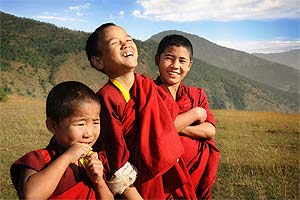Citizens of one of the happiest countries on Earth are surprisingly comfortable contemplating a topic many prefer to avoid. Is that the key to joy?
Thimphu, Bhutan — On a visit to Thimphu, the capital of Bhutan, I found myself sitting across from a man named Karma Ura, spilling my guts. Maybe it was the fact that he was named Karma, or the thin air, or the way travel melts my defences, but I decided to confess something very personal.
 Not that long before, seemingly out of the blue, I had experienced some disturbing symptoms: shortness of breath, dizziness, numbness in my hands and feet. At first, I feared I was having a heart attack, or going crazy. Maybe both. So I went to the doctor, who ran a series of tests and found…
Not that long before, seemingly out of the blue, I had experienced some disturbing symptoms: shortness of breath, dizziness, numbness in my hands and feet. At first, I feared I was having a heart attack, or going crazy. Maybe both. So I went to the doctor, who ran a series of tests and found…
“Nothing,” said Ura. Even before I could complete my sentence, he knew that my fears were unfounded. I was not dying, at least not as quickly as I feared. I was having a panic attack.
What I wanted to know was: why now – my life was going uncharacteristically well – and what could I do about it?
“You need to think about death for five minutes every day,” Ura replied. “It will cure you.”
“How?” I said, dumbfounded.
“It is this thing, this fear of death, this fear of dying before we have accomplished what we want or seen our children grow. This is what is troubling you.”
“But why would I want to think about something so depressing?”
“Rich people in the West, they have not touched dead bodies, fresh wounds, rotten things. This is a problem. This is the human condition. We have to be ready for the moment we cease to exist.”
Places, like people, have a way of surprising us, provided we are open to the possibility of surprise and not weighed down with preconceived notions. The Himalayan kingdom is best known for its innovative policy of Gross National Happiness; it’s a land where contentment supposedly reigns and sorrow is denied entry. Bhutan is indeed a special place (and Ura, director of the Centre for Bhutan Studies, a special person) but that specialness is more nuanced and, frankly, less sunny than the dreamy Shangri-La image we project onto it.
– Full story : http://buddhistchannel.tv




